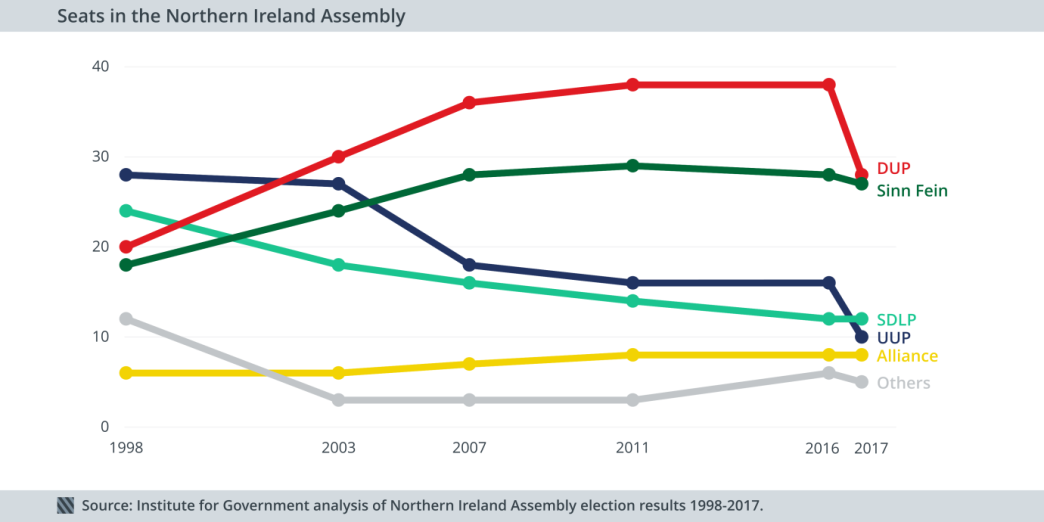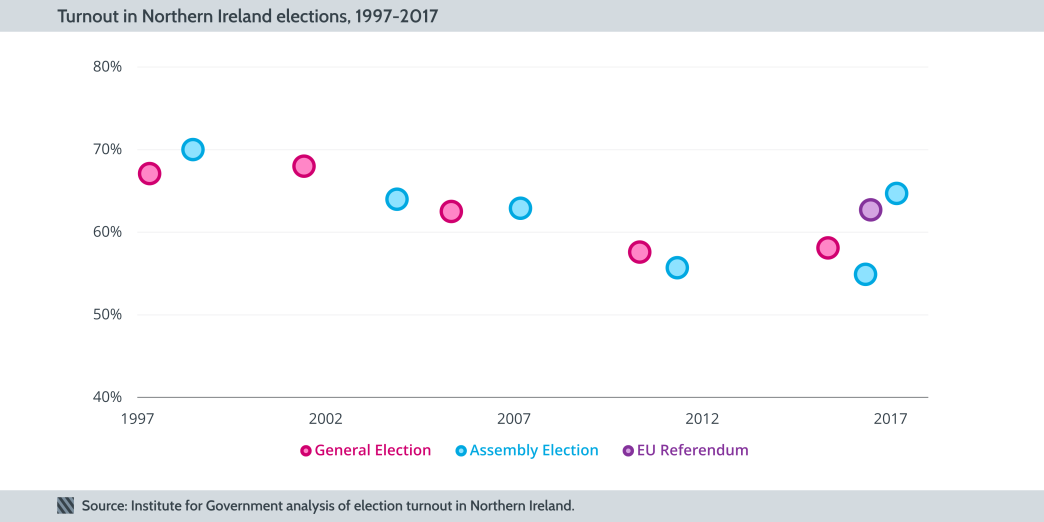Last week’s election in Northern Ireland has resulted in unionists, for the first time ever, losing their majority in the devolved Assembly at Stormont. Aron Cheung says the result will impact the government in Northern Ireland and the UK as a whole.
For the first time in its history, the Assembly in Stormont will not have a unionist majority. Unionists will hold only 40 of the Assembly’s 90 seats, while 39 will be held by nationalists and 11 by non-sectarian parties. The margin between the Democratic Unionist Party (DUP) and Sinn Fein, on both vote share and number of seats, has also been reduced to almost negligible levels.
Crucially, the results also mean the DUP will no longer have the 30 members necessary unilaterally to wield a ‘petition of concern’, a mechanism established to ensure that crucial votes have cross-community support, and which has in the past allowed the party to veto legislation that has majority support in the Assembly such as on marriage equality.
The task at hand for politicians in Northern Ireland is therefore to re-establish power sharing. The election, while momentous for other reasons, has not changed the fundamental requirements that the Northern Ireland Executive must be jointly led by the largest unionist and nationalist parties. Avoiding a return to direct rule from Westminster will therefore require the DUP and Sinn Fein to reach an agreement, within a three-week timetable. It is uncertain whether Arlene Foster will be successfully re-appointed as First Minister; Sinn Fein has suggested that it will withhold its support until an investigation is completed into the renewable heat incentive (RHI) scandal, but the DUP will be reluctant to be seen to capitulate to nationalist demands by replacing its leader.
The Social Democratic and Labour Party (SDLP) and Ulster Unionist Party (UUP) also have the right to hold positions in the Northern Ireland Executive, based on the number of seats they won. However, their participation is not a prerequisite. Both parties, as well as the non-sectarian Alliance Party, preferred to enter opposition after last year’s election, and they may once again choose this option.
This election mattered more
At the last Assembly elections in May 2016, only 55% of the Northern Ireland electorate voted, continuing a trend of falling turnout in both devolved elections and UK general elections since 1997. Just 10 months later, turnout went up 10 points at 65%. Anger over the RHI scandal, concerns about a hard border with the Republic of Ireland after Brexit, and the realistic prospect of Sinn Fein becoming the largest party, are all thought to have convinced voters that this election mattered more than usual.

A difficult result for unionists
While turnout was up, the number of seats up for grabs has fallen as each of the 18 constituencies elected five rather than six members of the legislative assembly, reducing the size of the Assembly from 108 members to 90. In the event it was the unionist parties that saw their representation in the devolved assembly fall sharply.
Of the 18 seats lost, 16 were lost by either the DUP or the UUP. Sinn Fein did well to lose only a single seat, while the SDLP and Alliance held steady.

A mandate for ‘special status’ after Brexit?
During the EU referendum campaign, all major parties in the Assembly except the DUP supported Remain, although the UUP have since accepted the vote for Brexit. The stark divisions between the DUP and Sinn Fein on this issue have contributed to the deterioration in their relationship that preceded the scandal over the RHI scheme.
In their 2017 manifestos, Sinn Fein, the SDLP, and the Alliance Party made the case for Northern Ireland having a ‘special status’ within the EU after Brexit, retaining its place in the Single Market and the Customs Union. The election result means that there is now a majority in the Assembly who support this objective.
Where next for Northern Ireland?
Concerns about Brexit and the border with the Republic of Ireland are high on the agenda, with Sinn Fein calling for a border poll after the UK’s decision to leave the EU while Northern Ireland itself voted to remain. The relative success of nationalist parties in this election will add to the speculation about Northern Ireland’s future in the Union. However, it is not clear that there is significant public support for reunification.
The annual Northern Ireland Life & Times survey has consistently found that the overwhelming constitutional preference in the region remains for devolved government within the United Kingdom. While a more recent poll has found a modest increase in support for reunification following the EU referendum, only 22% favoured this option.
The future of power sharing in Belfast, as it has for the last decade, rests principally on the shoulders of the DUP and Sinn Fein.
- Supporting document
- briefing-note-northern-ireland-elections v3.pdf (PDF, 600.25 KB)
- Topic
- Brexit Devolution